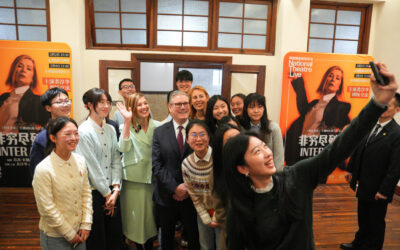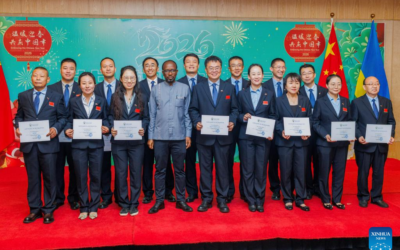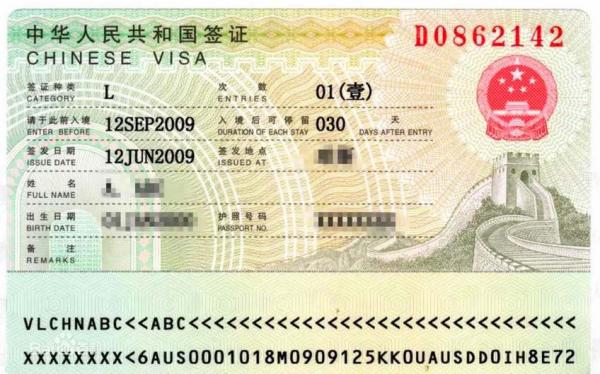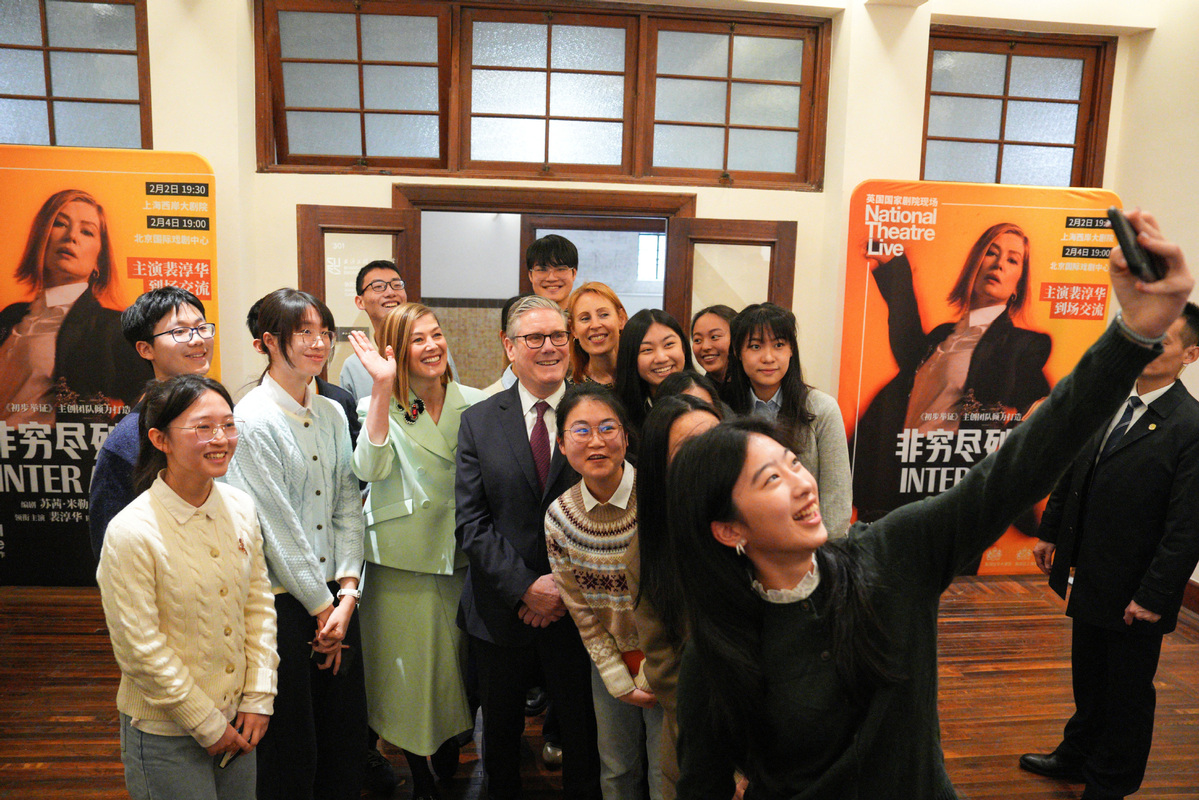In a significant move reflecting its commitment to international cooperation and shared development, China has introduced the new K visa, aimed at attracting high-level science and technology talent from around the world. This policy not only reaffirms China’s openness to global collaboration but also serves as a practical step toward realizing its Global Development Initiative (GDI)—a vision proposed to address the world’s most pressing development challenges through inclusiveness, innovation, and mutual benefit.
The K visa is designed specifically for international professionals who specialize in cutting-edge fields such as science, technology, engineering, and innovation. By streamlining entry procedures and offering more flexible residency options, China is opening its doors to a global talent pool, including researchers, innovators, and entrepreneurs. This move sends a clear message: China is committed to working with the world and welcomes those who can contribute to its high-quality development path.
Africa, in particular, stands to benefit from the opportunities opened up by the K visa. Talented African individuals working in science, engineering, agriculture, IT, and other technical sectors can now more easily take up positions in Chinese enterprises, research institutions, and innovation centers. Many Chinese companies, especially those involved in Belt and Road Initiative (BRI) projects in Africa, are increasingly looking for skilled professionals who understand local contexts while bringing technical expertise. African professionals who come to China under the K visa can gain valuable experience, participate in joint ventures, and contribute to technology transfer efforts that ultimately support development back in their home countries.
This policy is particularly important in the context of the Global Development Initiative, first proposed by President Xi Jinping in 2021. The GDI focuses on six priority areas: poverty reduction, food security, pandemic response, climate change, industrialization, and the digital economy. In all of these sectors, science and technology play a central role. The K visa supports the GDI by enabling international experts to take part in solving common development challenges. Their work in China could contribute to breakthroughs that benefit not only the country itself but also developing nations, particularly in the Global South.
Chinese enterprises are already working closely with African partners in fields like telecommunications, green energy, infrastructure development, and digital services. The K visa strengthens this relationship by facilitating the mobility of African experts, graduates, and researchers who are looking to build international careers. Whether through academic research, joint industrial projects, or internships with Chinese technology firms, African talent can now become a more active part of China’s innovation ecosystem.
By removing barriers to entry and offering a welcoming environment for foreign professionals, China is investing not just in its own progress but in global advancement. The K visa can be seen as a practical tool for inclusive development—bridging the knowledge gap between countries, promoting shared prosperity, and supporting capacity building across continents.
In today’s complex and interconnected world, no nation can tackle development challenges alone. The K visa embodies China’s belief that innovation and growth must be collaborative. It encourages the global exchange of knowledge, opens up channels for cooperation, and builds the foundations of a more inclusive and balanced global development framework.
Ultimately, China’s K visa is more than a policy—it is a reflection of a global vision. It offers a new platform for African and other international professionals to contribute to high-impact projects and benefit from mutual learning. At a time when the world faces multiple crises, this initiative stands out as a forward-looking approach to cooperation, showing that shared development is not just a slogan, but a reality being built—one skilled person at a time.








Wir haben versucht, das Casino zu kontaktieren, um weitere Informationen zu erhalten, aber es kam keine
Antwort. Der Spieler aus Finnland hatte nach Einlösung des
Willkommensbonus und Einhaltung aller Regeln Probleme, seine Gewinne abzuheben.
Der Spieler aus Finnland hatte Geld beim Happyhugo Casino eingezahlt
und die Wettanforderungen erfüllt, aber
das Casino weigerte sich, die Gewinne auszuzahlen und schloss das Spielkonto.
Sie spielen mit Android Smartphones und Tablets, iPhones und iPads sowie
auch Windows Phones und BlackBerrys einfach im mobilen Browser.
Das Casino lockt mit einem großzügigen Willkommensbonus von bis
zu 1.000€ plus 150 Freispielen. Insgesamt können Sie auf fast 6480 Glücksspiele in 11 Kategorien zugreifen und online Roulette, Bingo, Craps und Würfelspiele spielen. Wir
überprüfen unsere Systeme regelmäßig,
um sicherzustellen, dass sie fair und zufällig sind, damit jeder Spieler in einer
sicheren und zuverlässigen Umgebung spielen kann. Damit Sie sich darauf konzentrieren können,
die besten Spiele in unserem Casino zu spielen, arbeiten wir hart daran, sicherzustellen, dass Ihre Belohnungen reibungslos ausgezahlt
werden. Die von uns angebotene Plattform bietet eine große Auswahl an Tischspielen für Gamer,
die gerne strategisch spielen.
Dadurch wird es Ihnen nicht nur mehr Spaß machen, sondern Sie erhalten auch die
besten Belohnungen und Anerkennung in der Region. Sie erhalten unter anderem engagierte Account Manager, Sonderangebote und schnellere Auszahlungslimits.
Einladungen werden von Happy Hugo Casino an unsere treuesten Kunden verschickt, sodass
VIPs zusätzliche Vorteile erhalten, die über das hinausgehen, was Stammkunden erhalten.
References:
https://online-spielhallen.de/smokace-casino-erfahrungen-mein-umfassender-bericht/
Prüfen Sie vorher, wie viel Sie maximal mit dem Bonus gewinnen dürfen. Zum Beispiel, ab 20 € Gewinn mit dem Spielen aufzuhören oder zu Echtgeld zu wechseln, wenn der Bonus ausgeschöpft ist.
Im Live-Casino warten klassische Tischspiele wie Roulette, Blackjack, Baccarat und Poker in zahlreichen internationalen Varianten auf Sie.
Zusätzlich erklären wir Ihnen, wie sich die Nutzungsbedingungen von normalen Bonusangeboten unterscheiden und wie Sie immer wieder neue Bonusangebote ohne Einzahlung finden.
Leider werden derlei Bonusangebote jedoch immer seltener,
denn sie sind mit Kosten für die Casinos verbunden. Ein Online Casino Bonus
ohne Einzahlung ist so etwas wie der Heilige Gral unter den Bonusangeboten und jeder Spieler freut sich, wenn er ein solches
Angebot findet. Ausgezeichnetes Online Casino für
Echtgeld Glücksspielkenner Der Nachteil ist allerdings, dass
der Titel, für den die Freispiele gelten, vom Online Casino ausgewählt
wird. Freispiele ohne Einzahlung sind vor allem beliebt, weil sie oft
mit geringen Umsatzbedingungen verknüpft sind.
References:
https://online-spielhallen.de/online-casinos-osterreich-kompletter-leitfaden-2025/
Beim Blick auf die Bonus Angebote für die Stammkunden fällt auf, dass fast
ausschließlich auf Slot Freispiele gesetzt wird.
Viele Automaten-Anbieter legen noch 50 bis 100 Slot Freispiele
obendrauf. Wer neue attraktive Slotspiele sucht, kann in der Regel die Automaten nach Providern filtern.
Geprägt wurde der Slotspiele-Markt auch von Playtech, NetEnt und Microgaming.
Ein beliebtes Feature in vielen neuen Slots ist der
Bonus-Buy-Modus, mit dem sich Spieler direkt in die
Freispiele einkaufen können.
Nachfolgend finden Sie eine Rangliste mit den beliebtesten und besten Slots
für deustche Spieler, die Sie unbedingt ausprobieren sollten. Entdecken Sie die besten Online-Slots aus verschiedensten Genres – kuratiert aus dem Portfolio von über 70
Softwarestudios. Professionelle Supports stehen rund um die Uhr mit
Rat und Tat zur Seite.
Wählen Sie dann ein Spiel aus, das Ihnen zusagt, und spielen Sie es direkt in Ihrem Browser.
Hierfür gehen Sie bitte auf das Ranking der besten Online Casinos,
die Echtgeldspiele anbieten. Slots haben eine viel höhere Benutzerfrequenz als beispielsweise kostenloses Roulette oder kostenloses Blackjack – denn diese Spielkategorie ist in den letzten Jahren stark gewachsen.
Wählen Sie daher eines der oben aufgelisteten Spiele aus und beginnen Sie ohne irgendwelche Limits oder Einschränkungen zu spielen. Es ist kein Download oder
eine persönliche Registrierung erforderlich, um diese
Spiele zu spielen.
References:
https://online-spielhallen.de/vegasdream-freispiele-dein-traumstart-im-online-casino/
Wir bieten eine Vielzahl von Zahlungsmethoden an, um alle unsere Spieler zufriedenzustellen, und stellen sicher, dass Sie Geld einfach und sicher einzahlen und abheben können. Zusammen sorgen diese Anbieter dafür, dass unsere Bibliothek über 9.000
Spiele umfasst, darunter Spielautomaten, Tischspiele, Live-Casino-Optionen und vieles mehr.
Mit Evolution Gaming erhalten Sie ein erstklassiges Live-Casino-Erlebnis und Yggdrasil bietet einzigartige Spiele mit aufregender Spielmechanik.
Ich verstehe, dass es Regeln für kostenloses Bonusgeld geben muss, aber 30-maliges Durchspielen bei einem kostenlosen $5 war schwierig.
Den Willkommensbonus habe ich bereits genutzt und bin besonders gespannt, ob es weitere Freispiele oder vielleicht einen Bonus ohne Einzahlung für bestehende
Spieler geben wird. Der Bonus von 50 Freispielen ohne Einzahlung wird automatisch bei der Registrierung gutgeschrieben, es kann jedoch manchmal zu einer kleinen Verzögerung
kommen. Es tut uns leid, dass Sie Ihre Freispiele nicht erhalten haben.
Der Code ermöglicht Ihnen beispielsweise, bei der Einzahlung einen Bonus freizuschalten. Die Mr Bet Casino Bonus
Codes können Sie in Ihren E-Mails oder während spezieller Aktionen erhalten. Außerdem spielt es eine Rolle, ob Sie Ihr Spielerkonto
verifizieren müssen.
Kann ich bei Platincasino von einem mobilen Gerät aus spielen? Der große Vorteil ist, dass Du für eine Mitgliedschaft im PlatinClub nichts weiter
machen musst, als regelmäßig im Platincasino um Echtgeld zu spielen und das Geld dort einzuzahlen.
Suche Dir einfach ein Spiel aus, das Du spielen möchtest und probiere es sofort aus.
Indem Sie neue Spiele erkunden, strategisch
spielen und klare Grenzen setzen, stellen Sie sicher, dass
jede Sitzung so aufregend wie verantwortungsvoll ist.
Trag Dich einfach jetzt in den Platin News Newsletter ein und genieße
die vielschichtigen Boni, die regelmäßig auf Dich und alle anderen Leser
warten. Da sowohl solche Events als auch die
in unregelmäßigen Abständen stattfindenden Turniere immer frühzeitig angekündigt werden, kann sich jeder Spieler darauf einstellen. Weitere Events
wie unter anderem die Drops and Wins-Aktion des Anbieters Pragmatic Playwerden immer wieder veranstaltet und sorgen im Platincasino für eine Menge Abwechslung.
Platincasino ist seit 2013 ein etablierter Anbieter im europäischen Online-Glücksspiel.
Ja, neuen Spielern winken 20 Freispiele ohne Einzahlung – ein echtes Highlight für alle, die risikofrei
testen möchten. Viele Ein- und Auszahlungsmöglichkeiten stehen zur Verfügung, die Auszahlungen könnten jedoch manchmal
etwas schneller gehen. Der Kundensupport bei Platin Casino ist freundlich und antwortet blitzschnell, wenn man mal
Hilfe braucht. Sehr zuverlässiges und legales Online-Casino mit europäischer Lizenz –
das gibt mir ein sicheres Gefühl beim Spielen.
References:
https://online-spielhallen.de/alles-uber-vegaz-casino-freispiele-ihr-umfassender-leitfaden/
I always was concerned in this subject and still am, thanks for putting up.
The HTML5 technology ensures smooth gameplay and fast loading times across all devices
and browsers, though Safari is recommended for iOS users for optimal performance.
Our diverse game library caters to all preferences and playing
styles. For these type of pokies, we offer numerous bonuses for high-rollers, as well as competitions to win prizes.
The progressive jackpot slots deserve special mention, as they offer life-changing
prize pools that grow with every spin. Players
can explore everything from classic fruit machines that evoke nostalgia to modern video slots packed with innovative features.
The slot section serves as RocketPlay’s crown jewel, offering
an extensive collection that caters to every taste and playing style.
The casino’s commitment to quality is evident
in their careful selection of software partners, which includes industry giants and innovative newcomers alike.
Our real money online casino ensures fast processing times and flexible
limits for both deposits and withdrawals. Aussie players can try
new Australian online pokies to play for real money on their desktop and mobile devices.
When you play at our online casino Australia platform,
your data is protected with advanced SSL encryption technology.
The VIP Program at Rocketplay Casino rewards loyal players with exclusive perks,
bonuses, and premium treatment.
References:
https://blackcoin.co/playzilla-your-ultimate-pokies-destination-in-2025/
Those patrons wishing to use a companion card with the booking must be able
to present the valid card at the box office upon ticket
collection. Tickets for performances purchased through an authorised outlet will be fully refunded, including fees.
Crown Melbourne features a multi-level and basement level car parks,
with over 5,000 parking spaces as well as valet parking
services, for your convenience. Patrons must be 18+ to
consume alcohol and not be prohibited from the casino or any Crown property for any reason. Our website and Ticketmaster are the quickest and easiest way to secure tickets and will
provide access to available tickets for all performances.
The Palms will open 45 minutes before the show performance time
printed on your ticket.
Alternatively you can contact the Crown Rewards team at In 2009, a shopping mall called “The Commons” was completed on the campus, bringing 1.4 million square feet (130,
000 m2) of retail space, as well as restaurants, a soccer field and pub to the West Campus.
In February 2006, Microsoft announced that it intended to expand its Redmond campus
by 1,100,000 square feet (100,000 m2) at a cost of $1 billion and said that this would
create space for between 7,000 and 15,000 new employees over the following three years.
References:
https://blackcoin.co/dolly-casino-australia-complete-guide/
Choose whatever suits your current mood and enjoy not
just the thrilling atmosphere of games, but also real money winnings!
SkyCrown Casino counts more than 10,000 titles of games.
Selecting the right casino is about matching the platform to your style.
Offers competitive bonuses and lightning-fast cryptocurrency payouts.
Welcome to the ultimate gaming heaven, Sky City Casino located in the heart of
Nairobi, the vibrant capital city of Kenya. Copyright © 2024 myskycrown.com
is operated and owned by Hollycorn N.V., a company legally registered and
incorporated under the laws of Curaçao. We value your time and are dedicated to providing
fast and effective solutions.Join SkyCrown Casino Australia today and experience a world of endless entertainment.
Our commitment to transparency and trust ensures you can focus
on enjoying your experience. With SkyCrown, your sports betting experience is seamless, secure, and packed with opportunities.
No matter your gaming preference, SkyCrown Casino
Online has something to thrill and entertain.
This helps make your payments more secure and reduces
the potential for fraud. This lets you review, sign and submit
documents digitally via Business Internet Banking, with no need for time-consuming paperwork.
Managing your cards from your device is quick and easy, giving you greater peace of mind
when issues arise.
Follow our regular sign-up process to create a new account and claim your profile.
Pakistan is currently facing import bans from banks which includes many items essential for manufacturing are also not
allowed into the country. With profiles, you can keep your Chrome settings
separated by account, whether it’s creating space between work and personal or sharing your computer with others.
With Chrome’s privacy controls in your settings,
you can clear your browsing history or manage websites’ access to your location or camera.
Chrome is compatible with devices that run Windows and Mac operating systems, provided they meet the minimum system requirements.
To install Chrome, simply download the installation file, then look for it
in your downloads folder. Sign in to Chrome on any device to access your bookmarks, saved passwords, and more.
Open Banking is a secure technology that enables you to share
your account information with, and make payments through, regulated Third Party Providers.
For In Person banking, in addition to our branch network, you can use the
network of Post Office branches to assist with your banking requirements.
Need to know what banks are close by to Billericay?
References:
https://blackcoin.co/we-tested-50-aussie-online-casinos-these-paid-real-money/
You can play your favourite games with the casino app for real money at any time.
Winspirit mobile app offers a comfortable
and enjoyable gaming experience. WinSpirit Casino delivers a regulated, transparent, and mobile-ready experience for Australian players
in 2025.
As with any online casino licensed under Curaçao, it’s advisable for
players to stay cautious, read bonus terms carefully and start with smaller deposits.
Once inside, players can expect a dedicated host, higher withdrawal limits, faster
payouts, larger cashback percentages, and exclusive reload bonuses.
WinSpirit Casino focuses heavily on player rewards, which is why
bonuses are one of the platform’s strongest drawcards for
Aussie players.
References:
https://blackcoin.co/cashman-casino-slots-games-comprehensive-guide/
The extensive selection ensures that players can enjoy a unique gaming experience
daily for years. Recognizing the critical role of support services, Las Atlantis provides round-the-clock customer assistance through live chat and telephone,
ensuring players’ needs are promptly addressed.
For slot aficionados, Las Atlantis offers a vast collection of
online pokies, featuring numerous titles with substantial
progressive jackpots and impressive visuals. Jackpot games pepper the selection,
offering more than just a punt—they’re a ripper of a good time, jackpot or
not. Roulette enthusiasts can revel in more than just a spin with over 400 live-action games, including multiple roulette variants that are as varied as the
landscapes of Oz. Boho Casino,
a fresh face from 2022, has hit the Aussie
online gaming scene with a bang, flaunting an impressive
lineup of over 7,900 online pokies.
DundeeSlots offers a welcome bonus of up to AU$8,000 plus 180 free
spins, and 1Red Casino provides up to AU$15,450 with free spins.
Skilled players know that strategy significantly boosts their chances of winning at blackjack.
This blend of luck and strategy appeals to a wide range of players, from beginners to seasoned pros.
Be sure to bookmark Gamble.io and check back often for updated offers, new promotions, and honest reviews on top crypto casinos.
BitStarz has built a strong reputation as one of the best crypto
casinos, and for good reason. After playing at BitStarz, it’s clear why this casino
stands out in the crypto gambling scene. These games use blockchain algorithms that let you manually verify each
result, proving that the casino isn’t interfering with outcomes.
Live games are powered by Evolution and Pragmatic Play Live,
guaranteeing smooth gameplay with real-money betting and no RNG interference.
Many of these games offer customizable bet limits,
fast gameplay, and advanced strategy features.
I have been playing on Bitstarz for about 3 or so years now and have been nothing but
happy with their service, deposit… I have played on almost every casino platform
from the bad to the really good. But the only down part is that you wouldn’t want to play any pragmatic or
hacksaw game here if you… Bitstarz is a small boutique
casino, cash out is fast , interface user friendly and support is great!
But, how does BitStarz secure its unique spot and why should
you consider it your preferred gaming hub?
BitStarz Casino is your go-to destination for the most rewarding casino
experience. Each bonus is not only verified
but also regularly updated to reflect the latest offers.
Browse our page to find your perfect bonus or read our comprehensive BitStarz Casino review for more insights.
In the fifth and final season, Joe, after a long time, returns to New York City and is ready to live a good life at last, but his past and dark desires will collide
with this new life, where he meets Bronté. In the fourth season, Joe poses
as Jonathan Moore, living in London and working as an English
professor at a respected university. In the third season, Joe and
Love are married and raising their newborn son, Henry, in the Californian suburb of Madre
Linda.
Next, connect your wallet to the NFT marketplace of your choice.
Getting started with an NFT marketplace is easier than you think!
By focusing on these factors, you’ll find the best NFT marketplaces to match your style, budget, and interests.
Look for a platform that makes you feel part of something bigger.
Ref in this text area to quickly search our full set of tutorials, documentation &
marketplace offerings and insert the link! From here, you could show the invitee how to start a development
server, build system, or anything else that might
be relevant. After the terminal has been shared, collaborators will be able to view (and
edit, if applicable) the terminal. Then, click the username in the bottom status bar and choose Share Server.
With Live Share you can start the server locally and the other person can get access to the same running application. It
can be challenging to share with others when working on an application locally.
References:
https://blackcoin.co/best-skrill-casinos-for-uk-players/
All-gender restrooms, lactation rooms, meditation rooms, and ablution rooms, as well as universal design elements throughout, ensure equitable access.
Buildings include a variety of workspaces to support different working styles, from team neighborhoods and
focus rooms to informal meeting areas and recreational spaces.
Microsoft also published Environmental Product Declarations
to encourage manufacturers to provide material transparency.
Microsoft partnered with Building Transparency, a Washington state nonprofit organization,
to pilot the Embodied Carbon in Construction Calculator, which helps quantify overall carbon emissions.
By adding native and adaptive vegetation, using rainwater capture
for toilet flushing, and installing efficient fixtures and
irrigation, the campus is projected to save more than 20 million gallons
of water each year. The all-electric buildings are completely
fossil-fuel free, drawing renewable energy from off-site sources and the campus’s Thermal Energy Center, which houses a geothermal system
that provides heating and cooling for 18 buildings.
Beyond gaming, Crown Melbourne includes the renowned Crown Towers hotel, luxury spa facilities, fine dining with celebrity chefs,
and world-class shows. Whether you’re here to
play, relax, or indulge, Crown Melbourne offers an unmatched experience in the heart
of the city. This iconic property combines
world-class casino gaming, five-star accommodation, award-winning restaurants, vibrant nightlife,
and exclusive shopping. Casino gambling is legal in Victoria, as long as the casinos are registered outside
of Australia.
References:
https://blackcoin.co/betway-login-my-account-in-south-africa-2025-step-by-step-opening-guide/
They’re great for players who don’t trust crypto or prefer linking to their bank.
They’re ideal for players who value privacy
or want fast payouts without verification for smaller amounts.
Joka Casino and Wolf Winner Casino have slick apps for iOS and Android, with full access to games and
banking.
Yes, you can gamble with real money and play thousands of games at Australian online casinos.
Most of the online casinos that accept Aussie players are licensed by offshore foreign licensing bodies, offer certified games, and work
only with proven and trusted banking services.
Whether you’re chasing bonuses, climbing tournament leaderboards,
or just looking for a fun, fast-paced way to play online casino games, the sites we’ve featured deliver.
Whether you’re new to real money casino games or trying out esports
betting, here are a few quick tips to help you play smarter and (ideally) win more often at the
best online casino sites. We found over 6,000 games, making this a
top online casino real money Australia site for players who want choice and
depth.
Getting cash from brick-and-mortar casinos probably seemed
more convenient in the past, when online bank transfers
would take 2 weeks to process. Once your deposit has been processed,
open the game lobby and choose a game you want to play.
I have been playing poker on casino floors for over 20 years, and in that time, I have played over 500 different pokies.
We have plenty of gambling guides for new players to learn the ropes, including blackjack, roulette, and poker
strategies – make sure to check them out.
Study the games before playing.
References:
https://blackcoin.co/betonred-online-casino-a-bold-new-place-to-play/
paypal casino sites
References:
kairoskonnectinc.com
paypal casinos
References:
maxes.co.kr
online casino accepts paypal us
References:
https://www.azena.co.nz/bbs/board.php?bo_table=free&wr_id=4781688
casino sites that accept paypal
References:
https://www.thewaitersacademy.com/members/jamalhuntingto/activity/386708/
En outre, certains convertisseurs de formats vidéo sûrs populaires vous
seront également présentés.
وتم تحميل الفيديو في 30 يناير 2017، وجمع حتى الآن أكثر من 5.66 مليار مشاهدة و29 مليون إعجاب.
Keep functioning ,remarkable job!
Attractive section of content. I just stumbled upon your website and in accession capital to assert that I acquire actually enjoyed account your blog posts. Any way I will be subscribing to your augment and even I achievement you access consistently rapidly.
watch anal porn web offer
a varietyy of videos for adult entertainment. Opt for trusted web sources for a safe experience.
Really enjoyed reading this post.
The article does a good job explaining
how online cricket streaming works
in a
straightforward format.
A lot of users are curious
how they can watch live cricket online
and
this post provides useful insights.
Thanks for sharing.
It is really a great and useful piece of info. I’m glad that you shared this useful info with us. Please keep us informed like this. Thanks for sharing.
I’m really inspired with your writing abilities as well
as with the format to your blog. Is that this a paid subject or did you modify it yourself?
Either way stay up the nice quality writing, it’s rare to peer a
great blog like this one today..
Excellent post. I was checking continuously this blog and I am impressed!
Very helpful information specially the last part 🙂 I care for such information a lot.
I was looking for this certain information for a very long time.
Thank you and good luck.